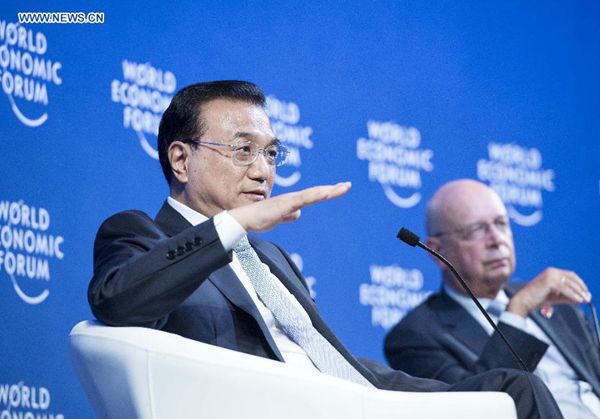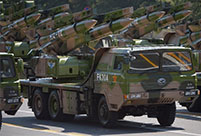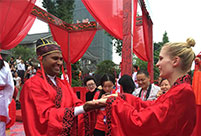

 |
| Chinese Premier Li Keqiang (L) exchanges views with Klaus Schwab, founder and executive chairman of the World Economic Forum (WEF) and other participants at the World Economic Forum (WEF) in Dalian, northeast China's Liaoning Province, Sept. 9, 2015. The three-day meeting will last from Sept. 9 to 11.(Xinhua/Wang Ye) |
“China is not the source of global economic risks. Instead, it is a driving force for global economic growth,” said Chinese Premier Li Keqiang at the World Economic Forum in Dalian on Wednesday. As he met with business leaders at the annual meeting, he clearly expressed his confidence in China's economy.
Answering the question “What is the new driving force of China's economic growth?” Li Keqiang said, “The world economy is still going down. China’s economy also bears downward pressure.” China’s economy could be described as “having a bright future in spite of fluctuations”, and the trend still points to a better position. That’s because China had 7 percent growth in the first half of the year, the best rates among major economies in the world.
“I once said that as long as there are enough jobs, household income grows at the same pace as GDP growth, and the environment is constantly improving, such a growth rate is satisfactory. Urban unemployment rate in the first six months was 5.1 percent, and 7 million new urban jobs were created. This indicates that China’s economy is operating within a reasonable range,” Li explained.
There were reports about China’s “deteriorating environment” for foreign investment. Li maintained that China’s general policy of using FDI will not be changed, but specific policies are indeed evolving towards the direction of attracting more foreign investment and opening more fields to foreign companies. For instance, China has broadened fields for foreign investment, and lifted restrictions on 50 percent of the items since this year. To better facilitate foreign investment, China has basically changed from the approval system to a record-keeping system. Now only less than 5 percent of the items need to be approved.
Li said China is exploring a new regulation model with pre-establishment national treatment and the negative list. China negotiates for a bilateral investment treaty with the United States and the EU respectively. China is also involved in free-trade agreement talks with many countries.
Li pointed out, “There will be more fields open to foreign investment in a more convenient way. China’s capacity to attract foreign investment has also been improved. In the first half of 2015, China’s FDI has increased by 7.7 percent, while the FDI in the world was not good.”
After Q and A with Premier Li, Arif Naqvi, founder and CEO of the Abraaj Group from United Arab Emirates told People’s Daily, "Premier Li spent one hour giving us a comprehensive account of the current situation of China's economy. Now, I feel completely relieved that China welcomes foreign investment. What I want to say most at this moment is that I will invest in China."
 Models change clothes on street in Hangzhou
Models change clothes on street in Hangzhou Charming iron ladies in China's upcoming V-Day celebrations
Charming iron ladies in China's upcoming V-Day celebrations In pics: armaments displyed in massive military parade
In pics: armaments displyed in massive military parade Charming Chinese female soldiers
Charming Chinese female soldiers Volunteers required not taller than 5ft 5in
Volunteers required not taller than 5ft 5in  Czech pole dancing master teaches in Xi'an
Czech pole dancing master teaches in Xi'an Shocked! PLA smokescreen vehicle drill
Shocked! PLA smokescreen vehicle drill Foreigners experience tranditional Chinese wedding
Foreigners experience tranditional Chinese wedding Blind date with bikini girls in Nanjing
Blind date with bikini girls in Nanjing China’s ghost riders
China’s ghost riders  US hawks full of bluster ahead of Xi’s visit
US hawks full of bluster ahead of Xi’s visit Measures prevented systemic financial risks: Premier Li
Measures prevented systemic financial risks: Premier Li France returning treasure to China sets precedent for further restitutions
France returning treasure to China sets precedent for further restitutions Day|Week